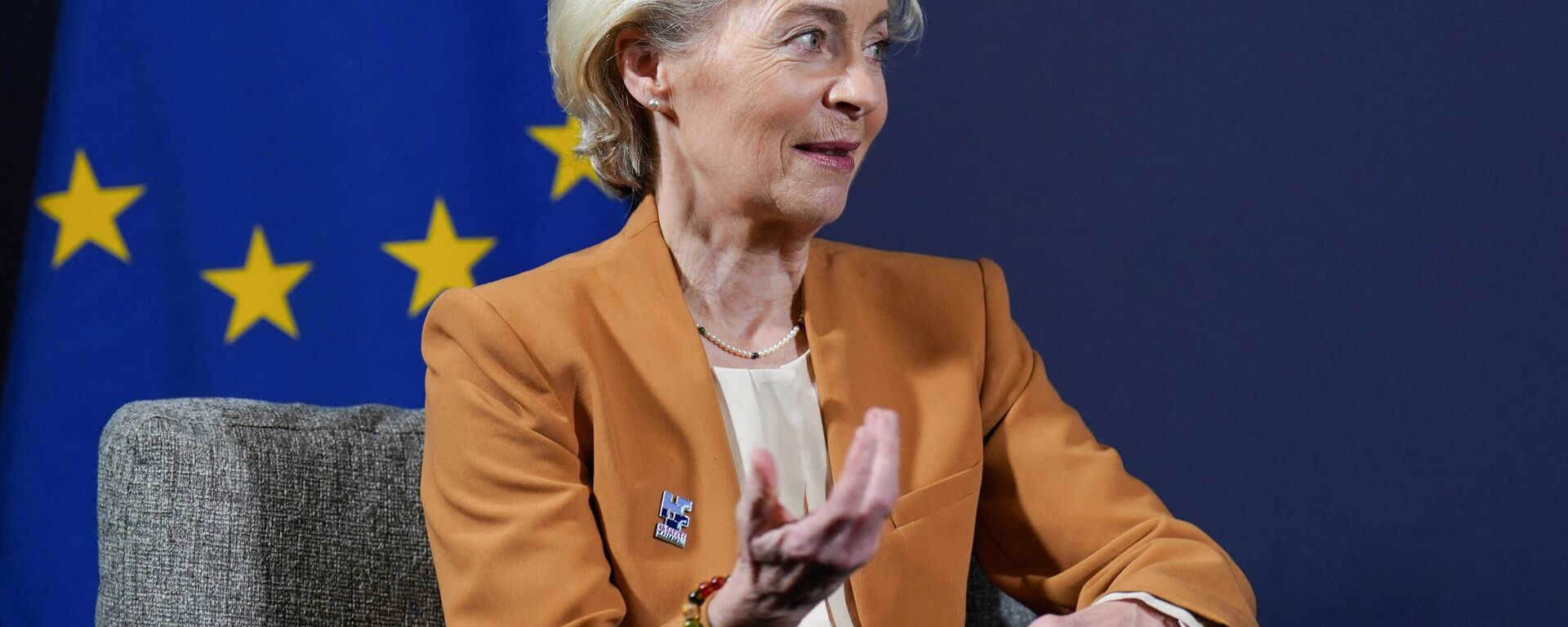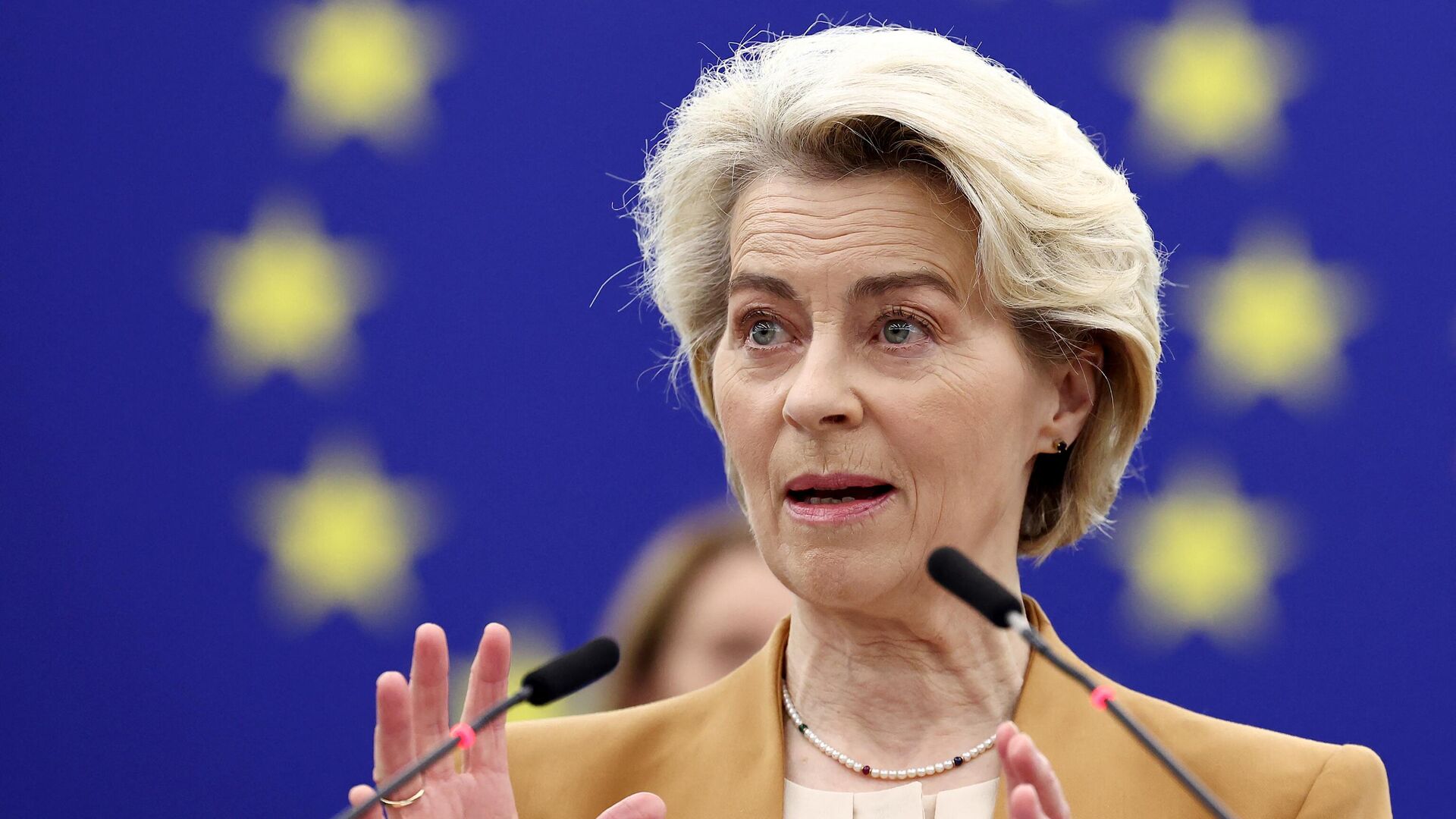https://sputnikglobe.com/20240222/von-der-leyens-foreign-policy-fails-to-undermine-russia-subordinates-europe-to-us-1116913571.html
Von der Leyen's Foreign Policy Fails to Undermine Russia, Subordinates Europe to US
Von der Leyen's Foreign Policy Fails to Undermine Russia, Subordinates Europe to US
Sputnik International
European Commission President Ursula von der Leyen’s foreign policy has failed to strategically weaken Russia and made Europe more subordinate to the United States than at any point during the Cold War, experts told Sputnik.
2024-02-22T06:47+0000
2024-02-22T06:47+0000
2024-02-22T06:56+0000
european union (eu)
russia
ursula von der leyen
analysis
https://cdn1.img.sputnikglobe.com/img/07e8/02/16/1116913750_0:0:3072:1728_1920x0_80_0_0_8eaadeef5dc10f159f0ccf05e681e246.jpg
Earlier in the week, von der Leyen confirmed that she would run for reelection as EU Commission chief. She also announced a new European defense strategy to be unveiled in three weeks. The strategy will consist of four main points: spending more, spending better, spending "more European" by investing billions of European taxpayers’ money, and using the experience of the conflict in Ukraine to "outsmart Russia" on the battlefield. The expert noted that von der Leyen's vision for the EU has been criticized for making the bloc more federalist and dominated by unelected bureaucrats. "The foreign policy trajectory represented by von der Leyen is marked by a push towards increased militarization and defense spending. A looming specter of a unified EU army has fueled fears that member states will witness a gradual erosion of sovereignty," Kasonta explained. Europe Between US and RussiaIn the latter part of her term, von der Leyen has reportedly forged a strong relationship with US President Joe Biden, who is also up for reelection later this year, due to the ongoing conflict in Ukraine and Biden's vocal internationalist stance, in contrast to his predecessor Donald Trump. Nevertheless, as Washington turns more attention to Asia, a trend that began during the Barack Obama administration, Europe is grappling with what it means for the continent. Srdja Trifkovic, the foreign affairs editor of the paleoconservative magazine Chronicles, pointed to von der Leyen's close ties to the US foreign policy establishment. "Thanks to the war in Ukraine, von der Leyen has managed to bring Europe under American control more firmly than it had been at any time during the Cold War," Trifkovic said. He also observed that the anti-Russian sentiment displayed by van der Leyen and people like her goes beyond a simple antipathy to the government of President Vladimir Putin and instead constitutes "loathing all things Russian," as Trifkovic put it. However, this does not necessarily mean that the EU’s foreign policy is guided solely by von der Leyen’s negativity toward Moscow. For one thing, the very notion of a united EU foreign policy is rather complicated, with individual countries often pursuing their own agendas even at the risk of alienating Brussels. Trifkovic cited Hungarian Prime Minister Viktor Orban as a leader who, unlike von der Leyen, understands the issue with isolating Moscow and sees Russia as an ally to preserve his country’s authenticity against both the US and the EU. Kasonta, for his part, drew attention to the diversity of European countries' historical experiences, which influence their approaches to foreign policy.
https://sputnikglobe.com/20231126/russia-regrets-von-der-leyens-praise-of-ukraines-euromaidan-coup---kremlin-1115214570.html
https://sputnikglobe.com/20231107/you-lie-like-you-breathe-internet-tears-into-von-der-leyens-hypocrisy-1114785333.html
russia
Sputnik International
feedback@sputniknews.com
+74956456601
MIA „Rossiya Segodnya“
2024
Sputnik International
feedback@sputniknews.com
+74956456601
MIA „Rossiya Segodnya“
News
en_EN
Sputnik International
feedback@sputniknews.com
+74956456601
MIA „Rossiya Segodnya“
Sputnik International
feedback@sputniknews.com
+74956456601
MIA „Rossiya Segodnya“
european commission president ursula von der leyen’s foreign policy, a new european defense strategy, billions of european taxpayers’ money
european commission president ursula von der leyen’s foreign policy, a new european defense strategy, billions of european taxpayers’ money
Von der Leyen's Foreign Policy Fails to Undermine Russia, Subordinates Europe to US
06:47 GMT 22.02.2024 (Updated: 06:56 GMT 22.02.2024) MOSCOW (Sputnik) - European Commission President Ursula von der Leyen’s foreign policy has failed to strategically weaken Russia, created a perception of eroding the sovereignty of member states and made Europe more subordinate to the United States than at any point during the Cold War, experts told Sputnik.
Earlier in the week,
von der Leyen confirmed that she would run for reelection as EU Commission chief. She also announced a new European defense strategy to be unveiled in three weeks. The strategy will consist of four main points: spending more, spending better, spending "more European" by investing billions of European taxpayers’ money, and using the experience of the conflict in Ukraine to "outsmart Russia" on the battlefield.
"Facts on the ground suggest that the EU’s foreign policy, or lack thereof, has failed to strategically weaken Russia or bring an end to the conflict in Ukraine. Rather, the narrative surrounding Russia serves as a pretext to consolidate power within the EU," Adriel Kasonta, a London-based political analyst, said, adding that "the war in Ukraine, once seen as a rallying point for European unity, is now perceived as a smokescreen for a broader agenda of centralization."

26 November 2023, 10:51 GMT
The expert noted that von der Leyen's vision for the EU has been criticized for making the bloc more federalist and dominated by unelected bureaucrats.
"The foreign policy trajectory represented by von der Leyen is marked by a push towards increased militarization and defense spending. A looming specter of a unified EU army has fueled fears that member states will witness a gradual erosion of sovereignty," Kasonta explained.
Europe Between US and Russia
In the latter part of her term, von der Leyen has reportedly forged a strong relationship with
US President Joe Biden, who is also up for reelection later this year, due to the ongoing conflict in Ukraine and Biden's vocal internationalist stance, in contrast to his predecessor Donald Trump. Nevertheless, as Washington turns more attention to Asia, a trend that began during the Barack Obama administration, Europe is grappling with what it means for the continent.
"As Washington pivots towards Asia to counter China, Europe finds itself urged to continue the proxy war on behalf of its transatlantic ally. This has translated into a recalibration of priorities, with more focus on military might and less emphasis on climate discussions. The EU’s trajectory, it seems, is bending towards aligning itself with American interests, even at the expense of its original environmental commitments," Kasonta said, while also noting that growing discontent with the EU’s green policies also pushed von der Leyen "towards a shift in priorities."
Srdja Trifkovic, the foreign affairs editor of the paleoconservative magazine Chronicles, pointed to von der Leyen's close ties to the US foreign policy establishment.
"Thanks to the war in Ukraine, von der Leyen has managed to bring Europe under American control more firmly than it had been at any time during
the Cold War," Trifkovic said.
He also observed that the anti-Russian sentiment displayed by van der Leyen and people like her goes beyond a simple antipathy to the government of President Vladimir Putin and instead constitutes "loathing all things Russian," as Trifkovic put it.
"There is a remarkable mixture of hostility and repulsion that is primarily culturally motivated, rather than geopolitically driven," Trifkovic continued, adding that "if Russia continues to be treated as the ultimate Other, to be excluded from the European security architecture and treated as a pariah, Europe’s demise will be accelerated and its recovery difficult to envisage."

7 November 2023, 12:12 GMT
However, this does not necessarily mean that the EU’s foreign policy is guided solely by von der Leyen’s negativity toward Moscow. For one thing, the very notion of a united EU foreign policy is rather complicated, with individual countries often pursuing their own agendas even at the risk of alienating Brussels.
Trifkovic cited
Hungarian Prime Minister Viktor Orban as a leader who, unlike von der Leyen, understands the issue with isolating Moscow and sees Russia as an ally to preserve his country’s authenticity against both the US and the EU.
Kasonta, for his part, drew attention to the diversity of European countries' historical experiences, which influence their approaches to foreign policy.
"The push for a homogenized foreign policy undermines the very essence of the European project, replacing diversity with a monolithic stance dictated from Brussels," Kasonta concluded.




